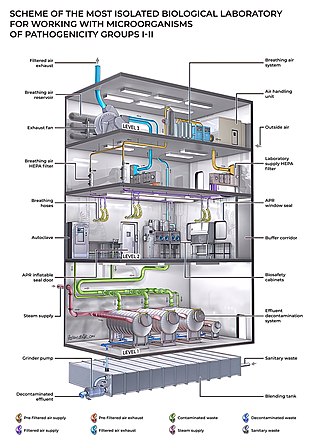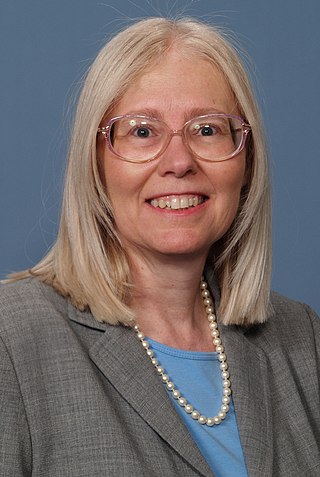
Salmonella is a genus of rod-shaped (bacillus) gram-negative bacteria of the family Enterobacteriaceae. The two known species of Salmonella are Salmonella enterica and Salmonella bongori. S. enterica is the type species and is further divided into six subspecies that include over 2,650 serotypes. Salmonella was named after Daniel Elmer Salmon (1850–1914), an American veterinary surgeon.

A biosafety level (BSL), or pathogen/protection level, is a set of biocontainment precautions required to isolate dangerous biological agents in an enclosed laboratory facility. The levels of containment range from the lowest biosafety level 1 (BSL-1) to the highest at level 4 (BSL-4). In the United States, the Centers for Disease Control and Prevention (CDC) have specified these levels in a publication referred to as BMBL. In the European Union, the same biosafety levels are defined in a directive. In Canada the four levels are known as Containment Levels. Facilities with these designations are also sometimes given as P1 through P4, as in the term P3 laboratory.

The fecal–oral route describes a particular route of transmission of a disease wherein pathogens in fecal particles pass from one person to the mouth of another person. Main causes of fecal–oral disease transmission include lack of adequate sanitation, and poor hygiene practices. If soil or water bodies are polluted with fecal material, humans can be infected with waterborne diseases or soil-transmitted diseases. Fecal contamination of food is another form of fecal-oral transmission. Washing hands properly after changing a baby's diaper or after performing anal hygiene can prevent foodborne illness from spreading.

Foodborne illness is any illness resulting from the contamination of food by pathogenic bacteria, viruses, or parasites, as well as prions, and toxins such as aflatoxins in peanuts, poisonous mushrooms, and various species of beans that have not been boiled for at least 10 minutes.
The Canadian Food Inspection Agency is a regulatory agency that is dedicated to the safeguarding of food, plants, and animals (FPA) in Canada, thus enhancing the health and well-being of Canada's people, environment and economy. The agency is responsible to the Minister of Health.
The National Microbiology Laboratory (NML) is part of the Public Health Agency of Canada (PHAC), the agency of the Government of Canada that is responsible for public health, health emergency preparedness and response, and infectious and chronic disease control and prevention.

Stanley "Stan" Falkow was an American microbiologist and a professor of microbiology at Georgetown University, University of Washington, and Stanford University School of Medicine. Falkow is known as the father of the field of molecular microbial pathogenesis. He formulated molecular Koch's postulates, which have guided the study of the microbial determinants of infectious diseases since the late 1980s. Falkow spent over 50 years uncovering molecular mechanisms of how bacteria cause disease and how to disarm them. Falkow also was one of the first scientists to investigate antimicrobial resistance, and presented his research extensively to scientific, government, and lay audiences explaining the spread of resistance from one organism to another, now known as horizontal gene transfer, and the implications of this phenomenon on our ability to combat infections in the future.

Food microbiology is the study of the microorganisms that inhabit, create, or contaminate food. This includes the study of microorganisms causing food spoilage; pathogens that may cause disease ; microbes used to produce fermented foods such as cheese, yogurt, bread, beer, and wine; and microbes with other useful roles, such as producing probiotics.

The University of Florida Institute of Food and Agricultural Sciences (UF/IFAS) is a teaching, research and Extension scientific organization focused on agriculture and natural resources. It is a partnership of federal, state, and county governments that includes an Extension office in each of Florida's 67 counties, 12 off-campus research and education centers, five demonstration units, the University of Florida College of Agricultural and Life Sciences, three 4-H camps, portions of the UF College of Veterinary Medicine, the Florida Sea Grant program, the Emerging Pathogens Institute, the UF Water Institute and the UF Genetics Institute.
Raw meat generally refers to any type of uncooked muscle tissue of an animal used for food. In the meat production industry, the term ‘meat’ refers specifically to mammalian flesh, while the words ‘poultry’ and ‘seafood’ are used to differentiate between the tissue of birds and aquatic creatures.

Mel Krajden is a Canadian physician who is a professor of pathology and ;aboratory medicine at the University of British Columbia in Vancouver, British Columbia. He is the medical director of the BCCDC Public Health Laboratory. Krajden obtained his BSc, MD, and FRCPC at McGill University, followed by a fellowship in Infectious Diseases at Stanford University. He is also the medical director of the Public Health Laboratory at the British Columbia Centre for Disease Control. His research focuses on the prevention and care of hepatitis, human papillomavirus, and human immunodeficiency virus.
Jorge Enrique Galán is an Argentinian-American microbiologist who specializes in infectious disease, bacterial pathogenesis including Salmonella.
Francis Allan Plummer was a Canadian scientist, academic and HIV/AIDS researcher. He was "a recognized specialist in infectious diseases whose work influenced public health policy in Canada and abroad". He was Distinguished Professor Emeritus of Medicine and Medical Microbiology at the University of Manitoba and Scientific Director General, National Microbiology Laboratory.

Arturo Casadevall is a Bloomberg Distinguished Professor of Molecular Microbiology & Immunology and Infectious Diseases at the Johns Hopkins Bloomberg School of Public Health and Johns Hopkins School of Medicine, and the Alfred and Jill Sommer Professor and Chair of the W. Harry Feinstone Department of Molecular Microbiology and Immunology at the Johns Hopkins Bloomberg School of Public Health. He is an internationally recognized expert in infectious disease research, with a focus on fungal and bacterial pathogenesis and basic immunology of antibody structure-function. He was elected a member of the National Academy of Sciences in 2022.

The Wuhan Institute of Virology, Chinese Academy of Sciences is a research institute on virology administered by the Chinese Academy of Sciences (CAS), which reports to the State Council of the People's Republic of China. The institute is one of nine independent organisations in the Wuhan Branch of the CAS. Located in Jiangxia District, Wuhan, Hubei, it was founded in 1956 and opened mainland China's first biosafety level 4 (BSL-4) laboratory in 2018. The institute has collaborated with the Galveston National Laboratory in the United States, the Centre International de Recherche en Infectiologie in France, and the National Microbiology Laboratory in Canada. The institute has been an active premier research center for the study of coronaviruses.

Caroline Colijn is a Canadian mathematician and epidemiologist. She holds a Canada 150 Research Chair in Mathematics for Evolution, Infection and Public Health at Simon Fraser University (SFU).
Welton Ivan Taylor was an American microbiologist, inventor and civil rights activist. He is known for his work on food-borne pathogens, notably for developing tests for Salmonella and for inventing the XLD agar, which can be used to isolate Salmonella and Shigella bacteria.
Gary P. Kobinger is a Canadian immunologist and virologist who is currently the director at the Galveston National Laboratory at the University of Texas. He has held previous professorships at Université Laval, the University of Manitoba, and the University of Pennsylvania. Additionally, he was the chief of the Special Pathogens Unit at the National Microbiology Laboratory (NML) of the Public Health Agency of Canada (PHAC) in Winnipeg, Manitoba, for eight years. Kobinger is known for his critical role in the development of both an effective Ebola vaccine and treatment. His work focuses on the development and evaluation of new vaccine platforms and immunological treatments against emerging and re-emerging viruses that are dangerous to human health.
Larry R. Beuchat is a food protection researcher and emeritus professor at the University of Georgia in Griffin, Georgia. Beuchat's work focuses on the microbiology of plant-based foods, molds and pathogens, and food safety. He has authored five books and 530 journal articles. In 2008, the International Association for Food Protection (IAFP) recognized Beuchat's contributions to research by creating the annual Larry Beuchat Young Research Award. In 2013, Beuchat gave Penn State University a gift of $1 million to create an endowed chair in his name for a Professorship in Food Microbiology.

Ann Marie McNamara is an American microbiologist and was formerly Vice President for Food Safety and Quality for the Supply Chain at US Foods. She has received a Distinguished Service Award from the United States Department of Agriculture, and received the International Association for Food Protection Fellow Award in 2012 and Food Safety Award in 2022.










